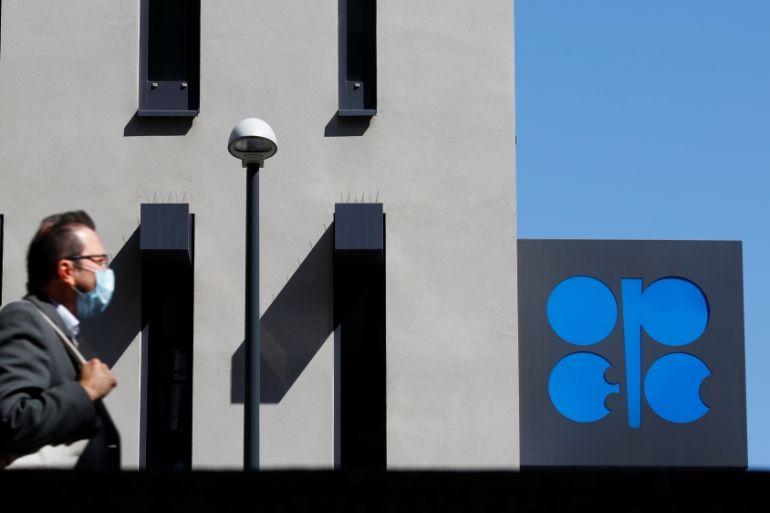Oil falls from $40 as doubts emerge over next step on OPEC cuts
Saudi Arabia and Russia agreed to extend existing cuts but the timing and scale of the deal remains murky.

OPEC leader Saudi Arabia and non-OPEC Russia have agreed on a preliminary deal to extend existing record oil output cuts by one month while raising pressure on countries with poor compliance to deepen their cuts, OPEC+ sources told Reuters News Agency.
But oil fell on Wednesday after jumping for awhile above $40 a barrel, the highest since March, then retreating as doubts emerged about the timing and scale of the potential extension to cuts. An OPEC+ policy meeting on Thursday rather than later in June is unlikely, sources told Reuters.
Keep reading
list of 3 itemsSaudi Arabia moved $40bn in reserves to sovereign fund
Oil gains on signs of improving demand, drawdown in inventory
Brent crude futures for August were down 13 cents, or 0.3 percent, at $39.43 by 15:48 GMT. The session high of $40.53 was the highest since March 6. West Texas Intermediate (WTI) crude for July fell three cents, to $36.78.
Oil prices were also pressured as United States refined product inventories surged in the week, raising concerns about demand.
“As product demand remains subdued, gasoline inventories showed a solid build, while distillates showed a mammoth one – despite refinery runs being more than 3.6 million barrels per day (bpd) below year-ago levels,” said Matt Smith, director of commodity research at ClipperData.
OPEC+ agreed to cut output by a record 9.7 million bpd, or about 10 percent of global output, in May and June to lift prices battered by plunging demand linked to lockdown measures aimed at stopping the spread of the new coronavirus.
Rather than easing output cuts in July, OPEC and its allies, a group known as OPEC+, were discussing keeping those cuts beyond June.
“Saudi Arabia and Russia are aligned on the extension for one month,” one OPEC source said.
“Any agreement on extending the cuts is conditional on countries who have not fully complied in May deepening their cuts in upcoming months to offset their overproduction,” the source said.
The group also considered holding an online meeting on June 4 to discuss output policy, after Algeria, which holds the presidency of the Organization of the Petroleum Exporting Countries, proposed bringing forward a meeting planned for June 9-10.
The first OPEC source said an earlier meeting on June 4 is also conditional on compliance and the discussions now are about implementing criteria for those countries who have not fully complied with the oil cuts and how they can compensate for their overproduction in the coming months.
“I don’t think there will be a meeting on Thursday. There are still many challenges,” another OPEC source said.
OPEC members Iraq and Nigeria have shown weak compliance with its output reduction targets in May.
Kazakhstan also failed to fully meet its obligations under the OPEC+ oil cut pact, sources said.
Two sources also told Reuters that Gulf OPEC producers Saudi Arabia, Kuwait and the United Arab Emirates (UAE) are not discussing extending their deeper voluntary oil cuts of 1.180 million bpd beyond June.
Oil prices rose in recent days from the lows of April buoyed by a continuing recovery in China, the epicentre of the coronavirus outbreak, while other economies are slowly opening up after lockdowns to contain its spread.
“Overall the market is moving in the right direction with the gradual easing of the lockdown. But we still need to be cautious. There is always a risk of another wave of the coronavirus,” the first OPEC source said.
“The other thing is how quickly will demand patterns recover. Inventories are still above average levels and that needs to be tackled.”